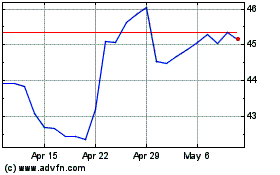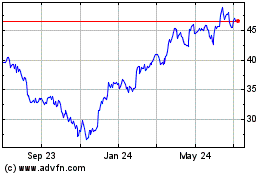GM's Opel Exit Is Rare No-Confidence Vote in European Market
March 06 2017 - 11:15AM
Dow Jones News
By Mike Colias and John D. Stoll
General Motors Co. sent a message Monday with the sale of its
money-losing Adam Opel AG operation to Peugeot SA: the world's
third-largest auto market isn't worth the trouble.
GM executives said pulling out of Europe allows the Detroit car
maker to slash engineering costs and lower the amount of cash it
needs to keep on hand. European buyers have fickle tastes and
European Union regulators have drawn up rules that would have
forced GM to spend heavily to meet mandates in a market where it
only has 6% market share.
The move is a rare vote of no-confidence in the continued
globalization in the auto industry, out of step with most industry
peers. Many executives have argued car companies need to get bigger
to pay for what is expected to be a convergence of consumer tastes
and regulatory mandates around the world.
Only a few years ago, GM appeared to be steering the
relationship with Peugeot in another direction. In 2012, GM took a
7% stake in then-struggling Peugeot, saying the deal could be the
start of a potentially broader alliance.
Less than two years into that agreement, however, GM sold its
stake. The two companies continued, however, to collaborate on
vehicles and technology.
GM's inability to reverse nearly two decades of losses in Europe
doesn't reflect the broader trend. Ford Motor Co., with 7.7% market
share in Europe, made $1.2 billion in 2016, representing 12% of
global profit.
"It was more than just the bottom line," GM President Dan Ammann
said in an interview, noting a multiyear turnaround plan put Opel
on a path to eventually breaking even. "It became clear the
European market was diverging from the rest of our business
elsewhere in the world."
Europe represents about 20% of global sales volume, slightly
less than North America's share.
Mary Barra, chief executive officer, said GM found only 20% of
the portfolio in Europe overlapped with the rest of GM's product
line, lessening opportunities to find commonality across regions.
Unlike American and Chinese buyers, European customers prefer
diesel engines and passenger-car body styles.
GM said it would continue to collaborate with Peugeot on certain
technology endeavors, including autonomous vehicles or
electrification.
The decision comes as U.S. auto makers are getting positive
signals from the Trump administration regarding corporate tax
reform and relief on emissions standards. GM will use savings from
the Opel exit for share buybacks and to sharpen focus on areas
where it aims to dominate -- the U.S. truck market, China and
autonomous vehicles.
GM Chief Executive Mary Barra, a member of President Donald
Trump's economic policy advisory team, in January announced more
than $1 billion in fresh U.S. investment. The auto maker earned $12
billion in North America last year and took about $2 billion in
dividends from its China joint ventures; it lost $300 million in
Europe, part of a $15-billion losing streak since 2000.
Over the past one or two years, Europe, which has always been
cutthroat due to a glut of capacity and national interests in auto
makers, became even more difficult from political, regulatory and
consumer-preference standpoints, Mr. Ammann said. Developing "a
winning plan in that environment" was too steep.
The U.K.'s vote to leave the European Union last year prevented
Opel from its first annual profit since before 2000. Meanwhile,
European environmental scrutiny has tightened amid the fallout from
Volkswagen AG's emissions scandal, forcing what many analysts
expect to be a broad and costly transition toward electrification
and away from diesel as the dominant engine technology in
Europe.
"Despite the strong progress in recent years, as we look forward
we see risks potential outweighing opportunities" for Opel without
adding the scale that PSA can provide, Mr. Ammann said. Peugeot
will now hold 16% of the European market, compared with 10% before
the deal.
Peugeot will pay EUR1.32 billion ($1.4 billion) for the Opel and
its sister Vauxhall U.K. brand, and it will team with BNP Paribas
SA to pay an additional EUR900 million for Opel's finance arm.
Write to Mike Colias at Mike.Colias@wsj.com and John D. Stoll at
john.stoll@wsj.com
(END) Dow Jones Newswires
March 06, 2017 11:00 ET (16:00 GMT)
Copyright (c) 2017 Dow Jones & Company, Inc.
General Motors (NYSE:GM)
Historical Stock Chart
From Mar 2024 to Apr 2024

General Motors (NYSE:GM)
Historical Stock Chart
From Apr 2023 to Apr 2024
